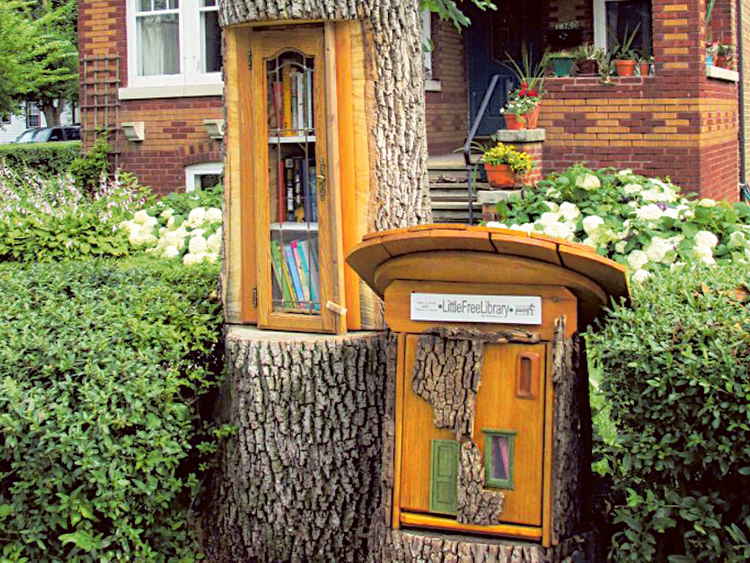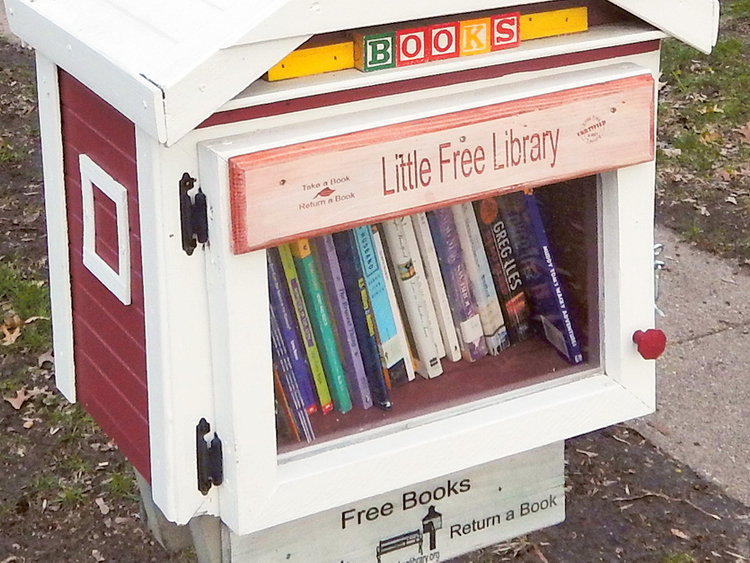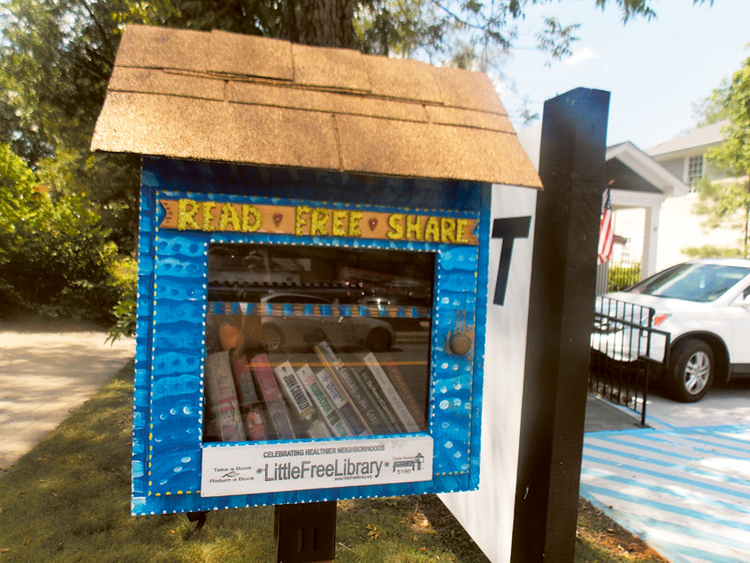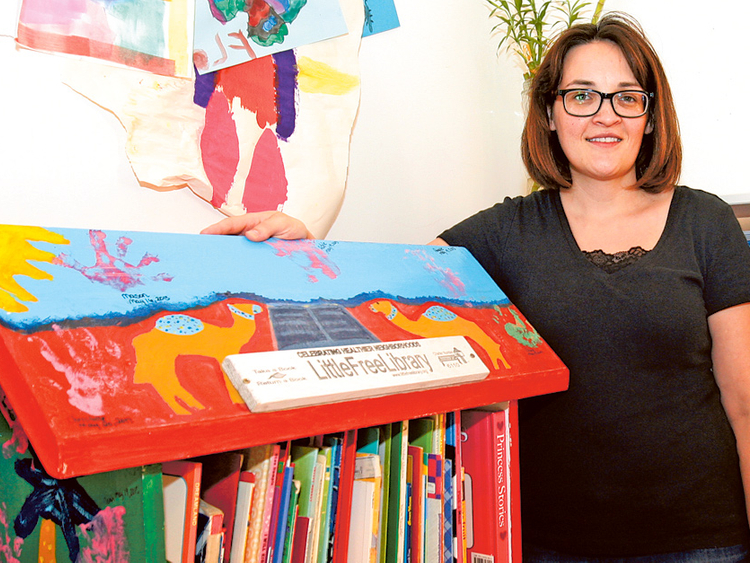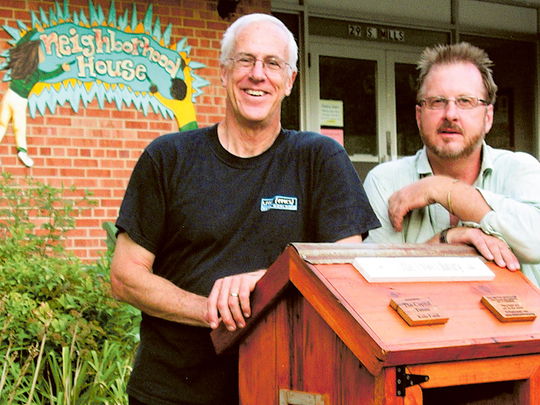
Painted in bright azure hues, what could have easily have passed off as a birdhouse in someone’s front yard stopped me in my tracks. I was on my walk in the university town of Athens (Georgia, the United States).
What made me take a closer look were three yellow-lettered words, “Read–Free-Share”, on its front. A small door was waiting to be opened. Hesitantly, I turned the knob and peered in. Neatly arranged books stared back at me. I reached out for “Chicken Soup for Pet Lover’s Soul,” encouraged by the white sticker below the door that cajoled: “Take a Book, Return A Book.” It bore the name “Little Free Library.”
I was still in a dilemma, when Darrah, my daughter’s friend, urged me to pick up the book.
“You can return it after you finish reading,” suggested Darrah to my delight. “And, you could also drop a book here.”
At 54, laying my hands on a book when I least expected to find one, brought out the child in me. Grinning, I carried home “Chicken Soup For Pet Lover’s Soul”.
This Little Free Library on Lumpkin Street shares the road with another Little Free Library standing right next door. In striking red and greyish black, this second library is a replica of the bank on whose property it has been installed.
A Google search later revealed that Athens has its share of Little Free Libraries. If Caren S., a retired school teacher put up one in her front yard, Barrow Elementary School boasts of two.
Keeping alive the memory of Judy Calkin, an Athens resident who passed away in 2011, is another Little Free Library in the neighbourhood of Snapfinger Woods. Her close friend, Cynthia Anne McLeod, put it up. “Judy had been the force behind our neighbourhood book club,” explains McLeod, who first spotted a Little Free Library in her parents’ neighbourhood of Summerville. Her husband, Benjamin Don Highfield, a professional wood-carver designed the Little Free Library in the contemporary style of houses in their neighbourhood. Nothing gives McLeod more joy than watching people browsing through books from the window of her study.
“The experience has been lovely,” says the 56-year-old librarian at Burny Harris Lyons Middle School, Athens.
“Books don’t have to be returned. People are free to keep them and pass them around. We just encourage them to drop off another book or two when possible.”
Little Free Library works on a simple concept of “Take a Book, Return a Book”.
You don’t have to bother about due dates, late fees, or library cards and the best thing about Little Free Library is that it is open all the time.
Brainchild of Hudson (Wisconsin)-based Todd Bol, the first example of what became ‘Little Free Library’ was set up in Bol’s front yard in 2009 as a tribute to his late mother, a former school teacher. Bol is founder president of Care-Forth, Inc.
“When my mother greeted anyone with a ‘Hello, How are you?’ she meant it,” reminisces Bol, who calls her “my dancing spirit”. “She seized every opportunity for friendship. I remember returning home from school and college, and finding her teaching children on the kitchen table.”
Using an old garage door dating back to the 1920s, Bol created the first little library box himself.
“Neighbours acted like it was a new puppy,” he recalls. A meeting with Rick Brooks, an outreach programme manager from the University of Wisconsin–Madison, took Bol’s idea further.
Brooks recalls: “Todd was an attendee at a workshop I was conducting in Hudson in 2009 about green environmental practices. After the workshop we explored various ideas for social enterprises that capitalised on each other’s skills and experience. Although we entertained a number of possibilities, I strongly suggested pursuing the social value of the box of books that Todd had built in his front yard. It was my belief, based on several decades of work in youth and community development, that the idea could serve as a vehicle to accomplish many benefits.”
With a goal of promoting a sense of community, literacy for adults and libraries around the world, and encouraging reading among children, Bol and Brooks set rolling the Little Free Library project.
To begin with, there was no start-up capital. Bol’s backyard served as a workplace where he built a couple of library boxes. Brooks managed marketing and outreach education work. In the first year only one library was sold. The next year, they distributed free of cost more than 4,000 signboards and nearly 100 free library boxes. “We had to build the idea and attract people to build the momentum,” adds Brooks, who had played leadership roles with 30 non-profit organisations, besides being actively involved in the Sarvodaya Shramdana Movement in Sri Lanka and the US since 1998.
As demand for Little Free Libraries grew, Bol found Amish carpenter Henry Miller in Wisconsin. Miller recycled wood from a 100-year-old barn that was destroyed in a tornado for Little Free Libraries.
“Todd also established a working relationship with a wood-working programme at Wisconsin correction facility [prison],” Brooks recalls.
Brooks developed a website (www.littlefreelibrary.org), coordinated media presence and created the social marketing strategy. The number of adopters of Little Free Libraries began to swell.
“We learnt the value of stewardship and how important it would be to have a decentralised approach at the grassroots level,” Brooks says.
In 2012, Little Free Library was registered as a non-profit organisation with two full-time employees assisted by a dedicated team of volunteers.
From sharing books to opening doors of conversation with neighbours, the Little Free Library movement spread its wings from its birthplace in Hudson to the rest of the US, eventually crossing its shores to other countries.
If Doo Sun You of South Korea put up a Little Free Library in front of his apartment, Antioinette Ashong, a school headmistress in Ghana, lured students into reading with a Little Free Library in Accra. Ashong and her colleagues eventually put up more than forty Little Free Libraries in Ghana and Nigeria, and also responded to inquiries from other countries.
Qatar got its Umayir’s Little Free Library, thanks to Umayr’s parents, Khalid and Yasmin Ansari. The Little Free Library concept found a footing in the UAE after Karibeth Gibbs set up one in her house in Al Ain. (See Box)
Bhavna Jain’s Little Free Library in Bangalore, India, is clearly an extension of her novel idea of sharing her books with customers at her restaurant.
“I have always been a voracious reader,” says the 43-year-old businesswoman. “I believe that a room without books is like a body without a soul.”
So in 2010, when she opened “Om Veg Restaurant”, she displayed books on a shelf.
“They were a mixed lot, some from my collection and some belonging to my school-going daughter,” Jain recalls. “Often guests settled down for a meal with a book.”
Coming across the Little Free Library online, Jain wrote to the organisation and received a free library kit.
“I got it installed outside my restaurant, which means the library is open 24 hours to the public. People can take a book and return a book whenever they feel like. There are regular readers who visit the library.”
Jain cleans it every day and is proud to be a part of this initiative that runs on trust and goodwill. “In today’s age of buying and selling, when everything comes with a tag, here is something that is free and to share,” she says.
What bewilders her, though, is the scepticism of adults who hesitate to pick up a book often wondering if they would be able to return it.
Jain tells them, “You don’t have to return the book. Just pass it on to someone else to enjoy.”
“Children seem to understand the idea better,” she adds.
However Stanley Ravi, another Little Free Library Steward in Bangalore, had a different experience. After setting up a Little Free Library in his neighbourhood, he realised that he had more than he could chew.
“The library got flooded with books within two weeks. There were all kinds of books, including a Phd thesis,” explains this social entrepreneur and soft-skills trainer. Ravi was left with no other option but to shut down the library. When he explained his situation to the organisation, they sent him five more signboards.
“It’s been two years but I have not yet been able to set up more LFLs in Bangalore. I have the kit and would be glad to assist anyone who wishes to set up a Little Free Library in India.” (Stanley Ravi’s email address is urgentley@gmail.com)
Alagu Muthu Eswaran (21), who set up Tamil Nadu state’s first Little Free Library in Rajapalayam has a different story. The Little Free Library placed inside his house has not attracted much interest. “People in my neighbourhood are not much into reading,” rues the commerce graduate who is making himself heard through Facebook and other social media.
Besides connecting neighbours, Little Free Libraries have unleashed a wave of creativity, such as the quirky owl-shaped Little Free Library in an Atlanta neighbourhood and the “castle” in Denver. A surprise gift for San Diego’s Susan Halliday was a miniature form of a Volkswagen bus, a Little Free Library made by her husband.
Thinking out of the box, Chicago resident Sarah Austin transformed an ash tree in her garden into an amazing Little Free Library.
Over email, Austin shares that an infestation of emerald ash borers had destroyed seven ash trees in her property. She and her neighbour Ron Elhers transformed one such tree into a Little Free Library. Friends from the neighbourhood pitched in by giving a water-proof finish to its roof made of cedar fence pickets.
“As an occupational therapist, I believe that being engaged in simple everyday activities that you value and enjoy is important for maintaining health,” Austin says. “The Library has been wonderful fun for me and I believe that it has contributed to the health and wellbeing of my community.”
Rekindling fond memories of Brandon Wyzbinski Gelzer are 29 Little Free Libraries installed by his parents and friends in Milwaukee, Wisconsin.
Animal lovers rejoiced as they found that designing Little Free Libraries was a good way to express themselves. Take a look at the Black Cat Little Free Library in the Silver Lake neighbourhood of Los Angeles. The Seattle-based Little Free Library was put up by Seattle Urban Farm Company in memory of Hugo, a white-haired fox terrier.
Craig Struble of Portland, Connecticut, went a step further. His Little Free Library sits in his flower garden next to a white chalkboard where he writes an inspirational quote every day.
Budget constraints? Check out the website for tips on turning old plastic storage boxes, mailboxes and even minifridges into a Little Free Libraries.
Touching 20,000 and still counting, Little Free Libraries are spread over 75 countries today. From that one little box in Bol’s front yard, this simple initiative’s growth has been phenomenal.
“It is beyond my dreams,” Bol says. “The movement leads me now. I am looking forward to the day, when we would greet one another with, ‘Hi! Whatcha reading?’ Wouldn’t that be wonderful?”
Brooks, who has now retired from the University of Wisconsin and Little Free Library, adds,“ I think Todd and I would say we are gratified and amazed by the staying power of the motto,‘Take a Book, Return A Book’. Because the idea of free exchange with few rules and regulations seems counter to most institutional approaches, it is sometimes difficult for people to grasp such freedom. But this has been a key part of the appeal of Little Free Libraries: generosity, sharing and mutual assistance for the common good, participation rather than control, and abundance rather than scarcity.”
So, whatcha reading?
Mythily Ramachandran is a writer based in Chennai, India.


